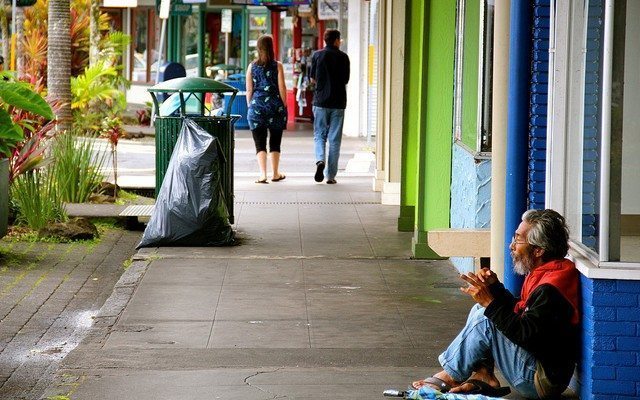 Image courtesy of [David Fulmer via Flickr]
Image courtesy of [David Fulmer via Flickr]
News
Honolulu’s New Law: Helping or Hurting the Homeless?
Millions of travelers visit Hawaii every year with the hopes of experiencing beautiful beaches, luaus, and other exciting adventures. With a record number of 7,998,815 visitors in a year, Hawaii is one of the most popular vacation spots for tourists. Because this is such a tourist heavy location, the city council in Honolulu has placed a few rules on the city that they believe will make tourists’ visits a bit more pleasurable. Most recently, Honolulu placed a ban that does not allow people to sit or lie down where a tourist can spot them–leading to controversy in the island vacation destination.
The island first placed this ban on the commercial parts of Waikiki, an area located on the southern shore of Honolulu, after receiving complaints about the city’s homelessness rate from the tourism industry. Mayor Kirk Caldwell’s spokesman, Jesse Broder Van Dyke, said at the time that Caldwell frequently received letters from tourists complaining about public drunkenness and urination. The city now wants to expand the sit-lie ban from just commercial areas to areas off sidewalks as well. Caldwell vetoed this bill, fearing that it is unconstitutional and could cost the city pricy legal fees. But the city council voted 6-3 in favor, overriding his veto. There is a huge concern that this ban targets those who are homeless and will put them in a position to get in trouble with the law. Caldwell stated,
If they make an argument that this legislation is based on targeting homeless, and not about commerce and business, then the whole bill is jeopardized.
Two members of the council, Brandon Elefante and Kymberly Marcos Pine, voted against the bill because they feel that it wrongly addressed the issue of homelessness. Councilman Ron Menor, who also voted against the bill, introduced a new proposal that would limit this ban to only commercial areas. Menor’s compromise never got a hearing in committee. A violation of the sit-lie ban ranges from warnings to fines and forced removal if necessary. Hawaii’s homeless population increased to 6,918 last year and citizens of Honolulu believe that the city should be more focused on providing housing and services than criminalizing homelessness. David Cannel, a 62-year-old man who was homeless for eight years, stated,
This is such a crisis. It’s a city of squalor. This isn’t a third world country. … Everyone has to go somewhere to get some sleep, at least. So where do they go?
While many have concerns that this law will hurt the homeless, the director of Hawaii’s Institute for Human Services, Connie Mitchell, believes that it is getting homeless people off the streets and beaches. She stated: “People are coming into the shelter. It’s working the way it’s supposed to.”
Van Dyke has made it known that Honolulu police will enforce this ban among tourists as well by saying, “Police have to enforce the laws equally against everyone. They don’t target homeless in park-closure enforcements.” A tourist that faces these charges can plead guilty by mail, or fight the charges in person. Failure to do so can lead to a criminal warrant for missing court dates. Mayor Caldwell has tried to address the homeless issue with a plan for a $42 million Housing First program which will not begin until later this year. He stated, “We have never promised we are going to solve homelessness, and I don’t think anyone who does is being honest. But I think we can make a dent.” The Honolulu Police Department will enforce the law, which depends on the number and type of complaints they receive about people sitting or lying on the sidewalks. City officials did not say when enforcement of the expanded ban will begin.
This leaves many people questioning if Honolulu really cares about the well being of the homeless, or if the city is more concerned with keeping tourists happy and bringing in their money. With more than 3.5 million people experiencing homelessness every year in America, this is a huge issue that needs to be addressed. Citizens want to see the city working hard to bring the homeless into shelter, rather than working hard to reprimand them because they are resting in a commercial area. Although many people seem to be against it, if the ban can truly help those who are homeless then it will become very beneficial for the city.








Comments